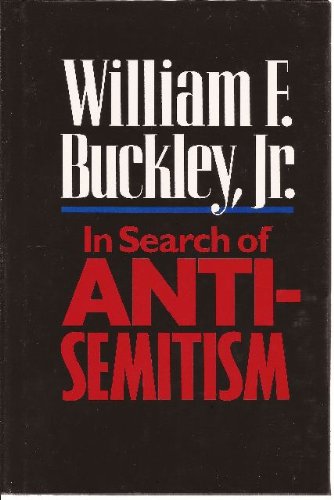Diversity Macht Frei
November 9, 2016
The German composer Richard Wagner coined the term Verjudung (pronounced Veryoodung) to describe the process through which Jews altered the culture of the peoples they lived among. It can various be translated as Jewification, Judaization or just Jewing.
In this and future articles, I will explore the Verjudung of American conservative thought; or rather what passes for American conservative thought, since I will argue that this process of Jewification has resulted in a set of ideas that are self-destructive rather than conservative.
For a long time, the magazine National Review was the intellectual flagship of American conservatism. It was founded by William F. Buckley, a mellifluous, conservative Catholic from a wealthy, well-connected family. Through his editorship of the magazine, and his hosting of a television debate show called Firing Line, Buckley became the dominant conservative American thought leader. For a generation he acted as the de facto arbiter of what was acceptable and what was not within the conservative canon. His vision focused on opposition to the Soviet Union, socialism and state intervention more broadly, while rejecting those he dismissed as “racists”, “antisemites” and the “paranoid fringe”.
Living in New York, Buckley had many Jewish contacts.
The degree to which the conservative editor and commentator William F. Buckley Jr., founder of National Review magazine and TV’s “Firing Line,” was inspired by contacts with Jewish contemporaries may not be fully known to those outside his circle of friends and political foes. Buckley, who died in 2008, is honored with “A Torch Kept Lit: Great Lives of the Twentieth Century.” It is a bintel of memorial appreciations by Buckley, chosen by (((James Rosen))), chief Washington correspondent for Fox News.
A vocal Catholic, Buckley once wrote: “I’ve always subconsciously looked out for the total Christian and when I found him he turned out to be a non-practicing Jew.” He was referring to Richard Clurman (1924-1996), an American Jewish journalist and administrator. Nephew of Harold Clurman, the theater critic and director, Richard Clurman was noted for expertise on media, especially relating to his long-time employer, Time Magazine.
Buckley may have sought another “total Christian” in the conservative Jewish activist Marvin Liebman (1923 –1997), a National Review cofounder. Liebman converted to Roman Catholicism with Buckley standing as his godfather and Buckley’s sister Priscilla as godmother. Later, Liebman abandoned conservative causes for their homophobia and also renounced Catholicism. In his memoir “Coming Out Conservative” (1992) Liebman wrote that as a gay Republican, he had started to feel “like a Jew in Germany in 1934 who had chosen to remain silent, hoping to be able to stay invisible as he watched the beginning of the Holocaust.”
In the 60s and 70s some Jewish (and some Catholic) intellectuals drifted from the Democratic party towards the Republicans. They founded the magazines Commentary and Public Interest, which became the house journals of this “neo-conservatism”, acting as engines of Jewish influence in American intellectual life.
Buckley found himself increasingly drawn into unwanted conflicts with these strident Semitic voices. As a result of these controversies, Buckley made two signal excommunications that helped define modern public conservatism in America as the kosher conservatism we now know it to be. The victims were Joseph Sobran and Patrick Buchanan, each of whom dared to criticise the favouritism shown towards Israel by US administrations and the role of Jews in promoting it.
The interactions between Buckley and his Semitic antagonists followed the standard pattern of exchanges through which Jews seek to silence goy who dare to talk back: bombardment with accusations of wickedness or moral impairment; insinuations of impure motivation for saying something rather than addressing the substantive merits of what was said; covert, behind-the-scenes arrangements through which the desired silence of the goyim is secured.
Buckley ultimately sacked Sobran and tainted Buchanan with insinuations of antisemitic motivation, while engaging in a kind of theological hair-splitting about whether or not he was, in fact, an antisemite. He also wrote an essay and book called “In Search of Antisemitism” in which some of these themes were explored.
Sobran later wrote about his dismissal and what had prompted it.
Bill and I had been good friends for most of the 21 years I’d worked for him. But the friendship was strained in 1986, when he took the side of my attackers in a row over Israel. When Norman Podhoretz and his wife Midge Decter accused me of “anti-Semitism,” Bill wrote a weird public disavowal of my columns on Israel, saying in effect that I wasn’t anti-Semitic, but deserved to be called anti-Semitic. What made it so bad was that I knew he didn’t even believe what he was saying. It was a failure of nerve. That was clear even from the disavowal itself, which included a sweaty digression on Jewish retaliatory power.
Earlier that year, he’d taken me to dinner to warn me of the dangers of being “perceived,” as they say, as an anti-Semite. His book makes it sound like a long campaign to set me straight, but it wasn’t like that at all. Bill didn’t suggest I’d done anything wrong or that he disagreed with anything I’d written. But Norman Podhoretz was mad at me. That was enough. Later that evening when I told Bill about some Irish Catholic fans of mine who told me they prayed for me, he sneered, “You don’t need those people.” Bill denies having said this (I was fired for quoting it), but he said it, all right. In itself it would be a small thing, but it describes his own policy: ignore the Catholics, cultivate the powerful. (Try to imagine him writing a book against abortion.)
I continued in my wicked ways, criticizing Israel as an albatross for the U.S. In May the Zionist apparat went public in its smear against me, throwing the National Review into a total panic. There was hysteria in Bill’s apartment the night he and the other senior editors discussed it: the disavowal had been prepared behind my back. This was the first I’d heard of it. Bill’s statement didn’t even mention the Podhoretzes by name, as if he was protecting their anonymity. Every other published account of the incident, on both sides, spoke freely of the Podhoretzes’ role; but for some reason, National Review tried to pretend they had nothing to do with it. Furthermore, all responses from the magazine’s readers — who were overwhelmingly on my side — were suppressed. (A couple of years later, when the Podhoretzes accused Russell Kirk of anti-Semitism, National Review was the only conservative publication that didn’t even report it.)
I couldn’t understand what the fuss was about. I’d merely applied conservative principles — the things National Review stood for — to Israel: it was a socialist country with no conception of limited, constitutional government, which discriminated against Christians, while betraying its benefactor, the United States, and turning the Muslim world against us. It seemed pretty clear-cut to me, and none of the reasons conservatives gave for supporting Israel made much sense. Nobody really disagreed with me. That, in fact, was the problem. Nothing creates more awkwardness than saying things people can’t afford to admit they agree with. Disagreement is manageable. It’s agreement that wreaks havoc. If people disagree, they’ll debate you. If they secretly agree with something, but are furious with you for saying it, then they’ll try to shut you up by any means necessary. As Tom Stoppard puts it, “I agree with every word you say, but I will fight to the death against your right to say it.”
Everything about the uproar puzzled me. After all, I was and am a columnist, not a political leader. I sit alone in a room and write things I hope will make sense to someone out there. I don’t ask readers to accept things on my authority; I appeal to what is already publicly known. So what difference did it make what my motives were (supposing the Podhoretzes could know what they were)? Either my 700-word arguments made sense, or they didn’t. Why should anyone get that excited? Why go to such lengths to prevent the relatively few people who like to read arguments from reading mine? But Bill acted as if it were a life-and-death matter. With Bill’s statement, National Review became, by default, a neoconservative magazine. It had virtually announced that its avowed principles didn’t apply to Israel, and that its conservatism had no real separate existence from that of Commentary or The Public Interest — both of which, in fact, were scooping National Review with feisty anti-liberal journalism. It was so eager to agree with, and especially to get along with, the power Zionists of Manhattan, that it wouldn’t even defend its own from smears.
Source [Please click the link; this article is well worth reading in full]
After his death, Jonathan Tobin, writing in Jewish World Review, expressed his gratitude for the service Buckley had performed.
Though Buchanan would continue to snipe away on television, it was largely Buckley’s doing that he and others like him would do so from outside a perch in one of our two major parties rather than inside it.The long-term implications of Buckley’s stands were enormous. By remaking the conservative movement in his own image, in which the emphasis was on anti-communism and a libertarian skepticism of government power, he ensured that it, and the Republican Party, which it came to dominate, would be a place where Jew-haters were unwelcome. That enabled liberal Jews, such as Commentary editor Norman Podhoretz, to feel comfortable making common cause with the right on a host of issues as he began his own journey away from the left.
Though expectations that the Jews would ditch liberalism en masse were always unrealistic, the birth of an intellectually viable brand of Jewish conservative thought in this country wouldn’t have happened had not Buckley first cleaned out the GOP stables.
In terms of practical politics, Buckley’s rout of the anti-Semites made it possible for the sort of bipartisan consensus in favor of support for Israel that we now take for granted. He replaced the Buchanan-like world of American conservatism that existed before National Review with something that was not only more successful, but purged of Jew-hatred. If Israel Lobby authors John Mearsheimer and Stephen Walt want to find the real father of the enormous support for Israel in our political system today, they can look no further than the irrepressible Buckley, whose life was a testament to the power of ideas.
His was a political faith that most Jews never embraced, but as we survey a political spectrum in which our enemies are confined to the margins, we should all remember the unique achievements of this American original. May his memory be for a blessing for all who love liberty.
 Daily Stormer The Most Censored Publication in History
Daily Stormer The Most Censored Publication in History



